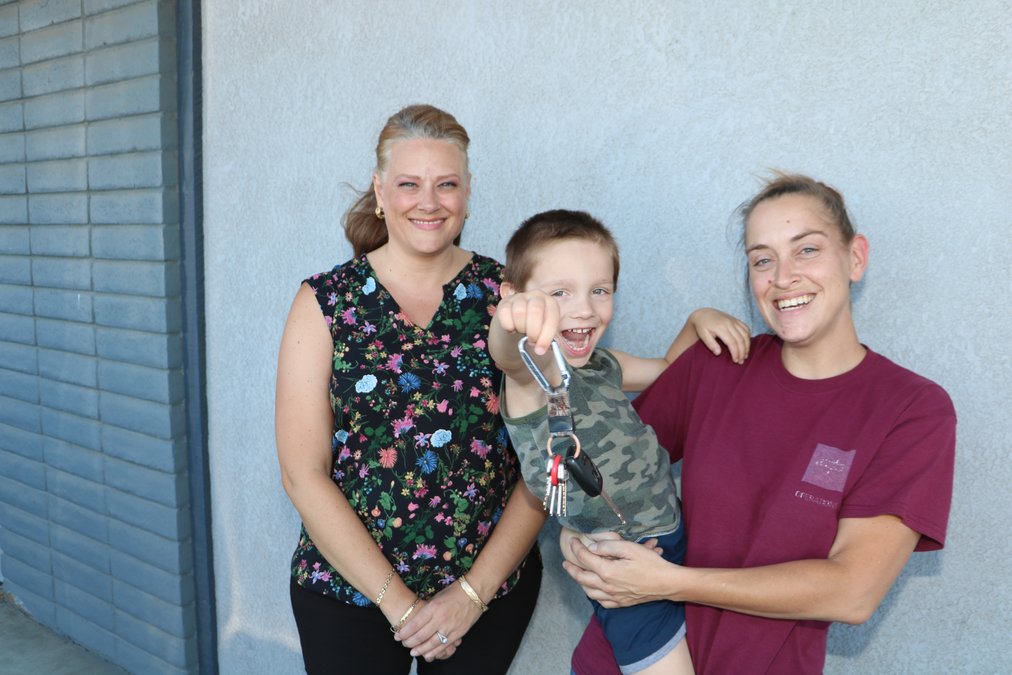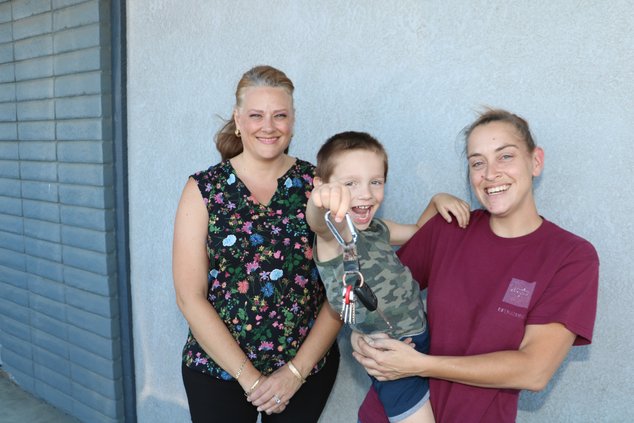HOPE works.
Just ask Amber Golisano.
She’s a 38 year-old single parent with a 5 year-old son named Elliott.
Golisano just bought her first home this month.
Three years ago, she was homeless.
Golisano had spent 4½ years on the streets.
And then HOPE entered her life — Helping Others & Providing Encouragement (HOPE) Ministries.
It’s the faith-based Manteca launched by a collaboration of local churches that has temporarily housed more than 6,000 people in the last 30 years.
HOPE Ministries last year had a 49 percent success rate when it comes to families leaving one of their three shelters and moving into permanent rental housing. That compares to the countywide success rate of just over 10 percent for other shelters.
Golisano, however, is the first HOPE client to go from a local shelter into owning her own home.
A series of bad relationships including a manipulative boyfriend who got her hooked on drugs set the stage for her being homeless over the course of 4 ½ years.
The event that ended her being without shelter was when her boyfriend, who had been cheating on her, put her couch out on the lawn, kicked her out, and took her last $100.
She lived in an abandoned
auto dealership at one point
By then her mother had died and her father hadn’t been around for years.
That was in 2015.
She ended up in seedy motels, then sleeping in an abandoned auto dealership and then in an abandoned dental office as well as couch surfing.
When she got pregnant, more people were willing to let her couch surf. She stayed awhile with a friend and then was able to move in with her grandmother.
Golisano was homeless again after that when her grandmother passed away.
Relatives took her to San Joaquin County Family Ties where she was able to get off of drugs. After her treatment Family Ties handed her a reference list of area shelters that included HOPE.
Golisano said she was terrified when she became homeless.
And while she had a real fear of living on the streets, she had been convinced by those who manipulated her that she deserved the situation she was in.
“I told myself I deserved what had happened to me,” Golisano said.
Her thinking changed when she gave birth to Elliott.
“I had him and it wasn’t about me anymore,” Golisano said.
Golisano moved into a HOPE Family Shelter apartment on Yosemite Avenue at the time when the Raymus Home on Union Road designed for single moms with kids was closed for remodeling.
She then moved to the Union Road location and ultimately was able to spend nearly two years in one of eight transitional housing units HOPE maintains while saving her money for a down payment.
Golisano said it wouldn’t have been possible without HOPE.
And HOPE Ministries Executive Director Cecily Ballungay said it wouldn’t have been possible if Golisano wasn’t driven.
Golisano was willing to do what it would take to provide for her son.
When she first arrived at HOPE Shelters, she literally would walk several miles to take her son to a babysitter and then go several miles more to a work experience site and then walk back to retrieve her son and return to the shelter.
Work experience led to her first job as a parttime worker at the West Yosemite Avenue Dollar Tree Store.
Ballungay said HOPE staff, based on her Golisano’s work ethic, reached out to benefactors that obtained a car for the single mom to use.
Golisano saved everything she
could for a $1,800 down payment
That allowed her to drive to Tracy where she landed a job at Medline earning $15 an hour working fulltime.
Her work ethic paid off at Medline. After a series of raises and promotions she is now making more than $22 an hour with benefits.
“I saved everything I could,” Golisano said. “When I received stimulus checks and tax refunds I put them into savings.”
That, Ballungay said, was not the case with others in the shelters who immediately spent the money or — as one minister involved with the program said — “blew right through the money.”
While at the transitional housing she paid a percentage of her salary for rent just as would happen in a federal subdivided housing unit.
“We do that so our clients can get used to budgeting funds for m when they are out on their own,” Bullangay said.
Golisano was determined not to just rent. She wanted to own a home to secure the stabilization that owning a home can bring where the mortgage is not subject to annual increases like rents are.
And while squirreling away money she accumulated enough cash to buy her own vehicle and return the car HOPE Ministries had provider.
“I didn’t want to owe anyone money on the car,” she said. “The car is important to me. It is how I get to work. I can’t afford to lose it.”
Golisano enlisted the help of Realtor Ben Adrian of Tracy for her house hunt..
After making offers on a number of properties, she had one accepted for a 1,400-square foot double-wide mobile home with three bedrooms and two bathrooms built in the 1970s that is located in a Stockton mobile home park.
Her $90,000 offer was accepted for a mobile home that was being sold by the three sons of a woman who had passed away.
The mobile home appraised for more than $110,000.
The brothers were willing to pay for work that came close to $5,000 to cover some issues that the mobile home park required to be addressed.
Adrian helped with the closing costs.
That means Golisano is now a homeowner, something that she dared not dream six years ago when she was living on the streets.
HOPE Ministries is seeking
those willing to help make
Golisano’s home more livable
Ballungay said HOPE Ministries is hoping people might be able to assist Golisano with some repairs to make her home more livable. They also asked Golisano what could be done to make Elliott feel at home as well.
The list includes:
*Creating a jungle theme in her son’s room given he is a big dinosaur fan who loves Jurassic Park.
*New flooring and carpeting as well as subfloor repairs.
*Painting the walls.
*Replace decking.
*A dresser and blinds.
*A “Raptor” bicycle for her son.
Those that would like to help can contact Ballungay at (209) 824-0658.
Golisano will be the speaker at the non-profit’s Night of HOPE planned for Friday, Nov. 4, from 5:30 to 9:30 p.m. at The River Mill in French Camp. The $80 tickets will go on sale Set. 15.
In a typical year HOPE serves 75 families encompassing 225 individuals of which 60 percent of children.
The faith-based profit doesn’t simply provide emergency shelter per se. They have counseling services for everything from money management to family interactions to addressing addictive behaviors. Those that need skills sharpened to be employable are provided such services and work with staff to secure employment.
One of the reasons why HOPE Shelters may enjoy a high success rate is because they “discriminate” by not allowing those testing positive for drugs to be sheltered and access programs.
That is considered discrimination under federal law. As such the requirement to test drug free cuts the non-profit off from many sources of government funds to help cover the cost of emergency homeless housing since agencies accepting such money must take everyone who shows up when they have room including those who test positive for drugs.
As a result, the bulk of their $300,000 plus annual budget comes from churches, businesses, private sector grants, and individual donations.
That doesn’t mean HOPE doesn’t take those dealing with addiction.
Applicants need to be clean when they are accepted and stay clean. HOPE provides services to help people stop abusing substances. If they relapse while at a shelter based on testing, they and their families are sent packing.
Those that can’t stay clean given it means their families will be off the streets aren’t considered ready to be effectively helped by HOPE Family Shelters. That’s based on them demonstrating they value using drugs more than sheltering their families.
Failing the test doesn’t mean they can’t reapply at a later date if they decide to stay clean and past drug tests.
HOPE Ministries has helped
more than 6,000 people
HOPE Ministries is in its 28th year of helping homeless families get back on their feet. Overall, they have helped more than 6,000 people since they first opened their doors in 1994.
The family shelter on Yosemite Avenue has seven apartments. The non-profit has acquired an adjacent lot with a house they plan to convert into a counseling center for families residing in the complex. They also hope to build three additional apartments that could end up housing between 6 and 24 more people at any given time.
HOPE Ministries also operates a shelter for single moms and children in a former rest home on South Union Road known as the Raymus House. That is in addition to a six-unit transitional housing complex near Doctors Hospital where families can stay for up to two years and pay 30 percent of their income in rent
For more information, go to hopefamilyshelters.org.
To contact Dennis Wyatt@mantecabulletin.com





